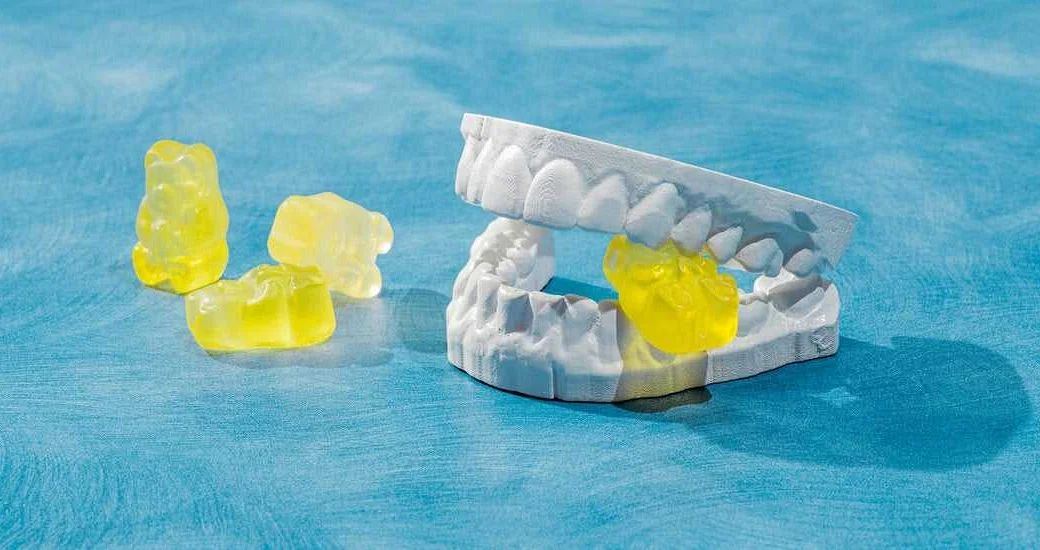10 Foods That Are More Damaging to Your Teeth Than Sugar – Some of Them Are Healthy Too
Содержимое
Find out the surprising 10 foods that can harm your teeth even more than sugar. Some of them are considered healthy, but they have hidden dangers for your oral health. Learn what foods to avoid to protect your teeth and maintain a beautiful smile.
When it comes to oral health, most of us know that sugar is one of the main culprits for tooth decay and cavities. However, there are actually several other foods that can be even more harmful to our teeth than sugar. What’s surprising is that some of these foods are considered healthy and are often included in our daily diet.
Citrus Fruits: While citrus fruits like oranges and lemons are packed with vitamin C and other nutrients, they can also be damaging to our teeth. The high acid content in these fruits can erode tooth enamel over time, making teeth more susceptible to decay.
Dried Fruits: Dried fruits, such as raisins and dried apricots, may seem like a healthy snack option, but they can be detrimental to our dental health. These sticky treats tend to cling to our teeth, providing a feast for harmful bacteria and increasing the risk of cavities.
Potato Chips and Crackers: While these crunchy snacks may not seem harmful, they can actually be quite damaging to our teeth. The starch in potato chips and crackers gets converted into sugar by the enzymes in our saliva, creating an acidic environment in the mouth that can lead to tooth decay.
Coffee and Tea: Most of us rely on our daily dose of caffeine to kickstart our mornings, but coffee and tea can stain our teeth and contribute to tooth discoloration over time. Additionally, adding sugar or sweeteners to your coffee or tea can further increase the risk of cavities.
Alcohol: Excessive alcohol consumption not only affects our overall health but can also have a negative impact on our dental health. Alcohol is drying to the mouth, reducing saliva production, which plays a crucial role in protecting our teeth against decay.
It’s important to note that moderation is key when consuming these foods and beverages. While they may pose a risk to our dental health, they can still be enjoyed in small quantities as part of a balanced diet. However, it’s always a good idea to brush your teeth or rinse your mouth with water after consuming any of these foods to minimize the negative effects on your oral health.
The Hidden Dangers of Citrus Fruits

Citrus fruits are known for their tangy taste and high vitamin C content, making them a popular choice for many people. However, while these fruits may be refreshing and nutritious, they can also pose some hidden dangers to your teeth.
One of the main issues with citrus fruits is their high acidity. The acid in these fruits can erode the enamel on your teeth, leaving them vulnerable to decay and cavities. This is especially true if you consume citrus fruits in large quantities or frequently throughout the day.
Another problem with citrus fruits is their tendency to stick to your teeth. Whether you are enjoying a slice of orange or sipping on a glass of lemon water, the juice from these fruits can linger on your teeth and gums. This prolonged exposure to citrus acid can further weaken your enamel and increase the risk of tooth decay.
It’s important to note that while citrus fruits can be harmful to your teeth, they also provide various health benefits. They are packed with vitamin C, which is crucial for maintaining a healthy immune system. Additionally, they contain antioxidants that can help protect against certain diseases.
To minimize the potential damage to your teeth from citrus fruits, it’s important to take a few precautions. First, try to consume them in moderation rather than as a staple in your diet. Second, rinse your mouth with water after eating or drinking citrus fruits to help neutralize the acid. Finally, wait at least 30 minutes before brushing your teeth after consuming citrus fruits, as brushing immediately can further damage the weakened enamel.
In conclusion, while citrus fruits can be a healthy addition to your diet, they can also have hidden dangers for your teeth. By being mindful of your consumption and taking appropriate precautions, you can enjoy the benefits of citrus fruits while protecting your dental health.
Crunchy Snacks: The Silent Teeth Destroyer

When it comes to harmful foods for your teeth, sugar often takes the spotlight. However, there is another group of snacks that can be just as damaging, if not more. These are the crunchy snacks that many people consider healthy alternatives to sugary treats. While they may provide some nutritional value, they can also wreak havoc on your dental health.
Crunchy snacks like chips, crackers, and pretzels are often made with refined carbohydrates, which break down into simple sugars in your mouth. When you chew on these snacks, tiny particles can get lodged in between your teeth and gums, providing a feeding ground for bacteria. This can lead to tooth decay and gum disease if proper oral hygiene practices are not followed.
Additionally, these snacks are often high in starch, which can contribute to the buildup of plaque on your teeth. Plaque is a sticky film of bacteria that adheres to the surfaces of your teeth and can cause tooth decay and gum inflammation. The texture of crunchy snacks can also be abrasive, wearing down the enamel of your teeth over time.
Furthermore, many crunchy snacks are acidic in nature, which can erode the protective layer of enamel on your teeth. This can make your teeth more vulnerable to tooth sensitivity and cavities, as well as discoloration.
It’s important to note that not all crunchy snacks are created equal. Some are healthier options than others. For instance, fresh fruits and vegetables like apples and carrots can be great alternatives to processed crunchy snacks. These foods are not only crunchy but also high in fiber and water content, which can help stimulate saliva production and promote good oral health.
While it’s okay to enjoy crunchy snacks occasionally, it’s essential to consume them in moderation and practice good oral hygiene habits. This includes brushing your teeth twice a day, flossing regularly, and visiting your dentist for check-ups and cleanings. By doing so, you can protect your teeth from the silent destroyer that many crunchy snacks can be.
Sticky and Chewy Treats: The Worst Offenders
While sugar is often blamed for causing tooth decay, there are other types of foods that can be even more harmful to your dental health. Sticky and chewy treats, in particular, are considered some of the worst offenders when it comes to damaging your teeth.
Sticky and chewy treats include foods like caramel, toffee, gummy candies, and dried fruits. These treats tend to stick to the surface of your teeth for a prolonged period of time, allowing the sugar and acids to linger and attack your enamel. As a result, they can increase the risk of tooth decay and cavities.
What makes these treats even more harmful is that they are often marketed as “healthy” alternatives, such as dried fruits. While dried fruits contain natural sugars and can be a good source of vitamins and minerals, they can also be detrimental to your dental health. The sticky texture of dried fruits makes them adhere to your teeth, and their high sugar content can contribute to tooth decay.
It’s important to note that it’s not just the sugar content of these treats that can harm your teeth. The stickiness and chewiness of these foods make it difficult for saliva to wash away the sugars and acids, increasing the time that they are in contact with your teeth.
To protect your dental health, it’s best to limit your consumption of sticky and chewy treats. If you do indulge, be sure to brush your teeth afterwards to remove any sugary residue. Additionally, regular dental check-ups and cleanings can help detect and prevent any potential dental issues caused by these worst offenders.
Remember, dental health is not just about avoiding sugar. It’s also about being mindful of the types of foods you eat and how they can affect your oral health. By making informed choices and practicing good oral hygiene, you can maintain a healthy smile.
The Surprising Truth About Dried Fruits

Dried fruits are often considered a healthy snack option. They are packed with vitamins, minerals, and fiber, making them a popular choice for those looking to maintain a balanced diet. However, when it comes to dental health, dried fruits can be surprisingly harmful.
One of the main problems with dried fruits is their sticky texture. When you eat a dried fruit, it tends to stick to your teeth, allowing sugars to linger on the surface for a longer period of time. This provides the perfect environment for bacteria to thrive and produce acids that can erode the enamel of your teeth.
Another issue with dried fruits is their high sugar content. While they may seem like a healthier alternative to candy or other sugary snacks, dried fruits can actually contain more sugar than you might expect. This is because the drying process concentrates the sugars in the fruit, making them more concentrated and potentially more harmful to your teeth.
Furthermore, dried fruits are often consumed in large quantities. It’s easy to eat a handful of raisins or dried apricots without realizing just how much sugar you are consuming. This can put your teeth at a higher risk of cavities and tooth decay.
So, what can you do to protect your teeth while still enjoying dried fruits? One option is to rinse your mouth with water after eating dried fruits. This can help wash away any leftover sugars and prevent bacteria from causing damage to your teeth. Additionally, you can try to consume dried fruits as part of a meal, rather than as a standalone snack. This can help dilute the sugars and reduce their harmful effects.
| Raisins | 59g |
| Dates | 64g |
| Apricots | 53g |
| Figs | 48g |
While dried fruits can be a healthy addition to your diet, it’s important to be aware of their potential impact on your dental health. By practicing good oral hygiene and consuming them in moderation, you can still enjoy the nutritional benefits of dried fruits without compromising the health of your teeth.